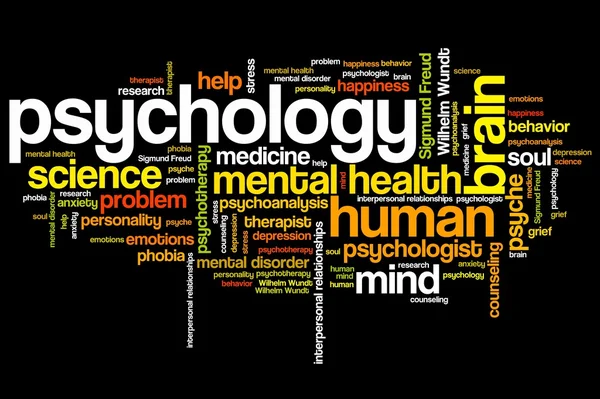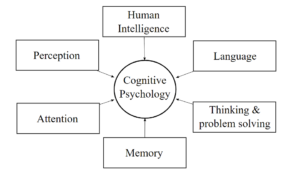“Understanding Psychology”
Psychology is the empathetic study of the complex phenomenon called Human Behaviour-The study of what brings out the best in us and what triggers the worst and it is the study of people’s behavior, cognitive attitude, performance, mental health functioning and stress issues.
An understanding of psychology helps in success in all fields, be it in hiring people, resolving conflicts, building relationships, selling, teaching, understanding child behavior and whatnot. Psychology helps in every field. Psychology is a valuable tool for understanding ourselves and others. It can help us to improve our relationships, make better decisions, and cope with difficult challenges. It is used in a variety of fields, such as education, business, and healthcare. It can be applied in every field. Psychology is important in our daily life.
Psychological tools like questionnaires and psychometric models provide critical insights into personal or interpersonal situations, psychological techniques like negotiation, therapy and feedback can often make a critical difference in handling almost any situation.However, psychology is not just about working with other people , it is also about handling oneself through success, failure,personal change and growth.
15 Major Branches of Psychology
Psychology is a diverse field with various streams or branches, each focusing on different aspects of human behavior, cognition, and emotions. Here are some of the major streams of psychology:
-
- Clinical Psychology: This branch deals with the assessment, diagnosis, and treatment of m
ental health disorders. Clinical psychologists work with individuals experiencing emotional, behavioral, or psychological difficulties to provide therapy and counseling. Compared to other branches this branch deals with diagnosing and treating people with emotional , behavioral and cognitive disorders. They treat patients through a series of counselling sessions, therapies, psychoanalysis. It involves helping people overcome disorders like anxiety, mania, depression or psychiatric illness that effect their day to day life functioning. Clinical Psychologists either work one on one or with a group that suffers from depression, substance abuse and eating disorders.
- Clinical Psychology: This branch deals with the assessment, diagnosis, and treatment of m
2. Counseling Psychology: Similar to clinical psychology, counseling psychology focuses on helping individuals cope with everyday life challenges, personal growth, and self-improvement. However, counseling psychology typically focuses on helping people with more everyday life challenges rather than severe mental illnesses. Counselors often work in educational or vocational fields like schools, colleges or their personal setups. It involves working with the people suffering from temporary issues such as stress, trauma or abuse as opposed to psychological breakdowns or crises.
Counseling psychologists use a variety of techniques to help their clients, including:
- Talk therapy: Counseling psychologists help their clients to explore their thoughts, feelings, and behaviors in a safe and supportive environment.
- Assessment: Counseling psychologists may use a variety of assessment tools to help them understand their clients’ strengths and challenges.
- Intervention: Counseling psychologists may provide their clients with specific interventions to help them address their problems. These interventions may include cognitive-behavioral therapy, mindfulness-based therapy, or other evidence-based treatments.
- Advocacy: Counseling psychologists may advocate for their clients on a variety of issues, such as access to healthcare, education, and employment.
“Cracking UPSC: From Zero to Hero, Aiming to become a Civil Servant”
3. Educational Psychology: Educational psychologists study how individuals learn and develop within educational settings. They focus on topics like learning theories, educational interventions, and student motivation. These psychologists design, develop and evaluate educational books, materialand process for education and training. They can work in schools, military, in private research and development companies. They analyse education and training needs, design lessons and methods of instructions, develop material for instruction across various media.
Educational psychology is an important field that has the potential to improve the quality of education for all students. By understanding how people learn, educational psychologists can help educators create more effective learning environments and develop better teaching methods. This can lead to better academic outcomes for students, as well as improved social and emotional well-being.
- An educational psychologist can study how different teaching methods affect student achievement in a particular subject. For example, they might compare the effectiveness of traditional lecture-based instruction with more interactive methods, such as group work or problem-based learning.
- They can develop a new intervention to help students with specific learning disabilities, such as dyslexia or ADHD. This intervention might involve providing students with additional support in the classroom, such as specialized tutoring or counseling.
- They can work with a school district to develop a new policy on bullying prevention. This policy might include strategies for identifying and addressing bullying incidents, as well as training for staff and students on how to prevent bullying.
- They work with teachers to develop lesson plans that are aligned with the learning needs of their students. They conduct research to identify the most effective teaching methods for different subjects and grade levels. They develop interventions to help students with learning disabilities. They provide counseling to students who are struggling academically or emotionally.
Educational psychology is a growing field with a lot of potential to improve the quality of education for all students. As when we learn more about how people learn, educational psychologists will be able to develop even more effective interventions and strategies to help students succeed.
4. Developmental Psychology: This stream examines human growth and development across the lifespan, from infancy to old age. Developmental psychologists study physical, cognitive, emotional, and social changes that occur at different life stages from infancy through old age.Originally concerned with infants and children, the field has expanded to include adolescence, adult development, aging, and the entire lifespan. Developmental psychologists aim to explain how thinking, feeling, and behaviors change throughout life. This field examines change across three major dimensions, which are physical development, cognitive development, and social emotional development.
Developmental psychologists use a variety of methods to study human development, including observation, interviews, surveys, and experiments. They also use a variety of theoretical frameworks to explain development, such as the biological perspective, the cognitive perspective, and the social-cultural perspective.Developmental psychology is a fascinating and important field of study. It can help us to understand ourselves and others better, and it can also help us to improve the lives of children, adolescents, adults, and the elderly.
5. Cognitive Psychology: Cognitive psychologists explore mental processes such as thinking, memory, problem-solving,language, and perception. They investigate how humans acquire, process, and store information. Cognitive Behavioural Therapy (CBT) is an approach that identifies the patterns of thought or behaviour contributing to one’s problems and tries to change these patterns. Some CBT Techniques include cognitive rehearsal, journalling, validity resting, guided discovery and behavioural experiments.
6. Social Psychology: Social psychologists study how people’s thoughts, feelings, and behaviors are influenced by others and the social environment. Topics of interest include conformity, attitudes, group dynamics, and prejudice. Social psychologists can help to design public policies that promote social harmony and reduce prejudice.
They can also help to develop marketing campaigns that are more effective at persuading people to buy products or services. Social psychologists can also be used to train people in negotiation and conflict resolution skills. They can also be used to help people to cope with stress and anxiety.
Social psychologists typically explain human behavior as a result of the relationship between mental states and social situations, studying the social conditions under which thoughts, feelings, and behaviors occur, and how these variables influence social interactions. Social psychology is a rapidly growing field, and there are many exciting new areas of research being explored.
7. Industrial-Organizational Psychology: This branch focuses on applying psychological principles to the workplace, including personnel selection, performance evaluation, and organizational behavior. It helps people to be more effective at work by enhancing motivation, reducing stress and setting up better people management systems in organizations. Industrial psychologists play an important role in creating and maintaining a healthy and productive workplace. They use their knowledge of human behavior to help organizations achieve their goals and improve the lives of their employees.
An Industrial psychologist can develop a new selection test to help employers identify the best candidates for a sales . It can design a training program to help employees learn new software skills. It can conduct a performance appraisal to assess an employee’s job performance.An Industrial psychologist can work with an organization to develop a new employee wellness program. It can conduct research on the factors that contribute to employee turnover.
8. Health Psychology: Health psychologists study the psychological factors that impact physical health and well-being. They may work on behavior change, stress management, and the role of psychology in disease prevention.Health psychologists work in a variety of settings, including hospitals, clinics, schools, and community health centers. They may provide individual therapy to help people cope with chronic illness, stress, or other health-related issues. They may also develop and implement health promotion programs to help people make healthy lifestyle choices.
A health psychologist might work with a patient who is coping with a chronic illness, such as diabetes or heart disease. The psychologist would help the patient develop coping mechanisms to manage the stress of the illness, and they would also work with the patient to make lifestyle changes that would improve their health. They can develop a health promotion program for a school.
The program might teach students about healthy eating, exercise, and stress management. The psychologist would also work with the school staff to create a supportive environment that encourages healthy choices. They can work with a government agency to develop a policy on smoking cessation. The psychologist would use their expertise to understand the factors that contribute to smoking, and they would develop a policy that would be effective in reducing smoking rates.
9. Criminal or Forensic Psychology: Forensic psychologists apply psychological principles to legal and criminal justice matters. They may work with law enforcement, attorneys, or in correctional facilities. Criminal psychologists work in a variety of settings, including law enforcement, prisons, mental health facilities, and universities. They may conduct research on criminal behavior, provide expert testimony in court, or work with offenders to help them rehabilitate. Criminal psychology is a fascinating and challenging field that offers the opportunity to make a real difference in the world.

Motivation: Sports psychologists can help athletes stay motivated and focused on their goals. They can also help athletes develop a positive attitude and self-belief. Mental toughness: Sports psychologists can help athletes develop the mental toughness to persevere through challenges and setbacks. They can also help athletes learn to cope with stress and anxiety. Imagery: Sports psychologists can help athletes use imagery to visualize themselves performing successfully. This can help athletes improve their performance and confidence.
Communication: Sports psychologists can help athletes improve their communication skills with coaches, teammates, and parents. This can help athletes build better relationships and work more effectively as a team. Career transition: Sports psychologists can help athletes transition from their athletic career to another career. They can help athletes develop their career skills and make a smooth transition to their new career.
11.Neuropsychology: Neuropsychologists investigate the relationship between the brain and behavior, focusing on how brain injuries or neurological disorders affect cognitive functions. Neuropsychology is a complex and fascinating field that is constantly evolving. Neuropsychologists play a vital role in helping people to understand and recover from neurological disorders. Neuropsychologists use a variety of methods to study the brain, including:
- Neuropsychological tests: These tests assess a person’s cognitive abilities, such as memory, attention, language, and executive function.
- Brain imaging: This technology allows neuropsychologists to see the structure and function of the brain.
- Animal studies: Neuropsychologists sometimes study animals to learn more about how the brain works.
“Mission IBPS PO :How to get your dream job in first attempt in 2023”
12. Experimental Psychology: Experimental psychologists conduct research to explore various aspects of human behavior and cognition in controlled laboratory settings. It is a field of psychology that uses the scientific method to study human and animal behavior. Experimental psychologists use controlled experiments to test hypotheses about how the mind works. They study a wide range of topics, including sensation and perception, learning and memory, motivation, emotion, and cognition.
It is a valuable tool for understanding human and animal behavior. It is used to develop new treatments for psychological disorders, improve educational practices, and design more effective products and services. Experimental psychologists play an important role in advancing our knowledge of the mind and behavior.
13. Child Psychology: These psychologists have about the same preparation as clinical psychologists; additionally they have the responsibilities of becoming acquainted with the developmental characteristics of a preadolescent child. They help treat children’s psychological and educational problems and work independently with schools as counsellors or therapists or they can practice in their own setup as well.
14. Psycholinguistics : They are the psychologist that are concerned with discovering the psychological significance of the properties of language , of linguistic organization, the meaning of words , syntax and how children acquire language .
15. Psychometric Psychology: This branch of psychology attempts to measure behaviour , mostly through the use of tools like tests and questionnaires. They design psychometric tools, analyse complex sets of data , develop pilot testing and validate such tests. They are typically well trained in mathematics, statistics and programming.
” Career Counselling: A Deep Dive into Finding Your Passion”


 ental health disorders. Clinical psychologists work with individuals experiencing emotional, behavioral, or psychological difficulties to provide therapy and counseling. Compared to other branches this branch deals with diagnosing and treating people with emotional , behavioral and cognitive disorders. They treat patients through a series of counselling sessions, therapies, psychoanalysis. It involves helping people overcome disorders like anxiety, mania, depression or psychiatric illness that effect their day to day life functioning. Clinical Psychologists either work one on one or with a group that suffers from depression, substance abuse and eating disorders.
ental health disorders. Clinical psychologists work with individuals experiencing emotional, behavioral, or psychological difficulties to provide therapy and counseling. Compared to other branches this branch deals with diagnosing and treating people with emotional , behavioral and cognitive disorders. They treat patients through a series of counselling sessions, therapies, psychoanalysis. It involves helping people overcome disorders like anxiety, mania, depression or psychiatric illness that effect their day to day life functioning. Clinical Psychologists either work one on one or with a group that suffers from depression, substance abuse and eating disorders.
One thought on “” 15 Major Branches of Psychology: Exploring the Fascinating World ! “”
Thanks for your help and for writing this post. It’s been great.